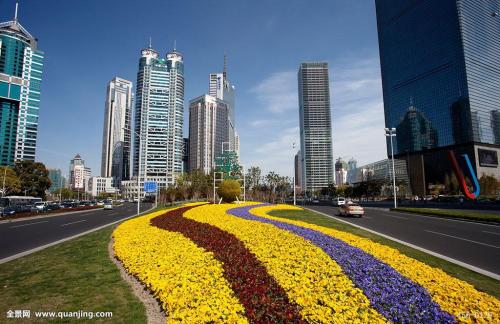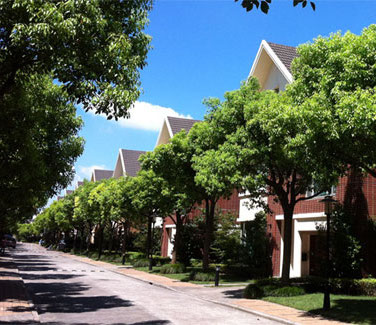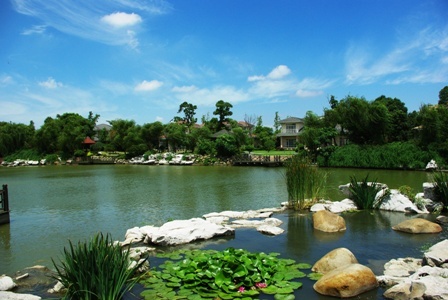Find Apartments, Villas, Serviced Apartments and Lane Houses for Rent in Shanghai
Latest Listed Homes for Lease
Our residential leasing service will help you find an ideal home in Shanghai and make your relocation effortless. Our listings cover areas from Pudong to Puxi. We have apartments, serviced apartments, studios, downtown lane houses, garden houses/villas near international schools, furnished or unfurnished. We list all types of residential properties including short and long-term leases, which are suitable for expatriates’ requirements.
- Lane 1-1000 Changning Road Old House
1 bedroom, 1 bathroom, 58 sqm
¥ /month PROMOTION Downtown, Downtown- Lane 1001-1500 Middle Huaihai Road Old House
3 bedrooms, 2 bathrooms, 120 sqm
¥ /month PROMOTION Downtown, Downtown- Lane 200-300 Wuxing Road Old House
2 bedrooms, 1 bathroom, 120 sqm
¥ /month PROMOTION Xujiahui, Downtown- Base Serviced apartment@Fuxing Road
2 bedrooms, 2 bathrooms, 145 sqm
¥ /month PROMOTION Xintiandi, DowntownTestimonial


Popular Expatriate Compounds Listing
Our Relocation Services
Orientation
Our customized orientation tour is a great way to familiarize new comers with a new city, our professional consultants will answer any and all questions/concerns you may have.
Home Finding
With in-depth expertise, our professional consultants will help you to pre-select, short list the available options and go with you to viewings. They are your invaluable resource.
Educational Assistance
Our school map on our website will help you to gather all essential information to contact schools which is the most important move related concern for families with children.
Visa & Immigration
Our in-house immigration team in concert with our destination service consultants make every step of your relocation process efficient.
Settling-in
Our settling-in service will help you experience an efficient start in your new environment. We will help you with settling up your utilities, internet, mobile and banking.
Tenancy Management
We are your partner during the duration of your entire lease term, as well as your link with your landlord and any help with any household issues.
Shanghai Residential FAQ
- · Is there a fee to pay to Fullhome for finding my home?
You do not need to pay any fee for our home finding service. The landlord will pay Fullhome an agency fee once the lease agreement is signed.
- · When should I begin the house hunting process?
We suggest that you start searching for a place one or two months before your desired lease commencement date. If you start house hunting too early, generally landlords will not agree to put their properties on hold for you, thus diminishing the chance of negotiating the best possible lease rates for you.
- · What type of housing is available for rent?
There are many options from which to choose from; you may search for housing in apartment complexes, houses, villas, or lane house/old garden house in downtown areas. It is important to discuss with your property consultant before you decide where to locate your family based on your housing budget, office location, children’s school and any other preferences.
- · Do I need a residence permit or work permit to lease a property in Shanghai?
No, you can lease a property without a residence permit. But if you reside in Shanghai, you must apply for one. More information from the Shanghai Government on residence permits can be found here.
- · Are most of the properties furnished in Shanghai?
Yes, most properties are furnished. However, some landlords are willing to remove part or all the furniture while some may refuse to remove any furniture simply because it is too much trouble to find storage. In some newly developed compounds, you may also request that the landlord furnishes the property according to your taste, such as purchasing the furniture along with you or simply receiving a furniture allowance to purchase the furniture of your choice by yourself.
- · What is usually provided in a fully furnished property?
Electrical appliances (such as a TV set, refrigerator, oven, microwave, washing machine/dryer), furniture (bed, sofa, coffee table, dining table and chairs, dining cabinet, study table etc.), curtains or blinds.
- · What about a Parking Space?
Most of the villas come with parking space; if not, it is likely you can park at the side of the road in front of your house. With apartments, you have to specifically ask and negotiate with the landlord. Some landlords may already have purchased a parking space when they purchased the apartment, and some may not. Expect parking to involve an extra fee ranging from a few hundred CNY to 2,000 CNY/ month for each parking space. If you have a motorbike, a parking space may save you a lot of trouble as some compounds are very strict about parking.
- · If I choose a newly-launched compound, what kind of problems may I have during my stay?
Newly-launched compounds usually offer competitive pricing to attract new tenants. You may have to face the following issues such as constant daily construction noise, unfinished facilities (gym, shops, restaurants etc.,), immature management support, unstable hot water supply, etc. We suggest you check the occupancy rate (maybe chat with a couple of tenants) as well as check the condition of its public facilities before you make a decision.
- · Initial Research.
Browse our website to get an idea of the property market in Shanghai destination city. Read compound descriptions, find locations, see listings of photo and price to narrow down the options.
- · Talk to Us.
Share with us your housing requirements and preferences by filling up the “Inquiry Form”. Factors to be considered are: preferred property type (such as villa, apartment, serviced apartment, old house/lane house), property size and number of bedrooms/bathrooms, lease term, ideal commencement date, housing budget, preferred location, furniture requirement (fully/partially furnished, unfurnished), commuting to work, home, school etc., particular facilities required (such as gym, swimming pool, tennis court etc.), school prerequisites, any other particular requests or preferences such as furnishing style, direction facing, floor preferences etc.
- · House Viewing.
Based on your “Inquiry Form”, our property consultant will send you a list of suitable properties prior to your house hunting.
On the house hunting day, our consultant will give you an overview of Shanghai expatriate residential communities integrated with customized orientation programs such as schools, hospitals, supermarkets, banks, restaurants and etc.
After visiting each property, our consultant will ask for your feedback so he/she will know your likes and dislikes and be able to narrow down your search more efficiently.
Once you have chosen your preferred compounds, our consultant will show you all available units in those compounds so you can make the final selection. - · Lease Negotiation & Contract Signing.
When you have selected the properties you prefer (first and backup choices), provide your consultant with the list of additional items that you would like to be added with regard to furniture and other renovation requirements (if any). He/she will review your list and suggest some that you may have overlooked (if any) and negotiate with the landlord. For corporate clients, our consultant will also work closely with your company’s HR or relocation company to ensure that the contract will adhere with your company’s policies. Upon acceptance, our consultant will prepare the lease agreement and send to both parties for signature.
- · What details should I consider about my apartment before signing the lease?
Although your ideal apartment might make you want to move in tomorrow, you still need to check some specifics to ensure a comfortable stay. Does the heating/air-conditioning system work properly? Do ceilings or floors crack? Don’t be afraid to raise these issues within reason. This being said, it is important that these matters are handled delicately so as to avoid making the negotiations confrontational. Often times, a conflict at this stage will put the landlords off entirely. It is best to draw up any reasonable requests and ask your property consultant to work on them. It is important to know if your landlord is reasonable and responsive to any legitimate concerns. Although price may be a big factor in your housing decision, you should consider that a willing landlord can make your stay more pleasant.
- · In what language is the lease agreement and what should I pay attention to?
The lease agreement is usually bilingual (Chinese and English) unless both parties are comfortable with one language. The template is normally standard although you need to pay attention to the lease term, deposit, rent and other charges, termination clause (if any), penalty term, landlord’s ID and ownership certificate. Usually your property consultant will help you go through the lease agreement to make sure your interests are well protected. Make sure that you clearly understand what is included in the rent and what is not, to avoid any misunderstanding later on.
- · What is the typical lease term?
One year lease is very common. However, a lot of landlords prefer a longer lease, specifically if you made a request for furniture or renovations. On the other hand, if you have a one year lease, you may face a rental increase when you negotiate renewal upon lease expiry. We suggest you talk to your property consultant to evaluate the pros and cons before you make the decision about lease term.
- · What fees can be included in the rent?
Normally the property management fee is included in the rent, other fees are negotiable, such as club/gym membership fee, heating fee, satellite TV fee, parking fee, internet setup and usage fee, utility allowance etc.
- · How much is the Security Deposit and when is it payable?
The deposit is paid within several days upon signing the lease contract. If the rent is payable on a monthly basis, the common market practice is for you to pay 2 months rent as security deposit. If you pay rent on a quarterly basis, the deposit is usually 1 month rent. However, some landlords will insist on 2 months rent regardless of rent payment terms. Currently there is a strong trend in that corporate clients are using a Bank Guarantee Letter as security deposit instead of paying a cash deposit. Some landlords will accept this depending on who the corporate client is, while other landlords will not. Your property consultant will work with you to obtain the best possible terms.
- · What is Fapiao and do I need one?
A fapiao is an official tax receipt in China which is issued by the local tax authorities. Currently the tax rate is 5% of the monthly rent. Corporate clients usually always require a Fapiao for tax purposes but for a personal lease, it may not be necessary.
- · When and how do I pay my rent? Which currency is acceptable?
Rent payment is flexible. The most common way is to pay quarterly (with one month rent as deposit) or monthly (with two months rent as deposit), sometimes you can also pay every other month. For a corporate lease, your company will make a bank transfer. For a personal lease, you may pay by cash (a receipt is strongly recommended) or by bank transfer (note: the account number has to match with the landlord's information which is part of the lease contract, or at least the account name should be the landlord’s name). CNY is the common currency used for rent payment. Even though rarely accepted, you may be able to pay by foreign currency provided that an exchange rate is agreed upon between the parties.
- · What are the things that I need to do or ask the landlord to do before moving in?
A thorough cleaning should be necessary. Ask the landlord to double check all electrical appliances, phone line/internet set up (if part of your lease agreement), make sure they are all in working condition.
- · What is the move-in procedure?
Your property consultant will prepare a “Check-in list” which contains a detailed inventory of furniture, appliances etc. The property consultant, landlord and you will go over the property to check if everything is on the list. We strongly advise you to write on this list any defects/damages found on the property upon move-in, such as cracks, spots, etc. The property management will check the utility meters and your property consultant will help you set up the respective accounts. In the end, the landlord will hand you the key and the “recorded check-in list” which will be signed by you, the landlord and your property consultant. It is better to test the TV signal, internet, phone, main appliances, lights, water pressure, Air Con/heating and door keys before you sign the check-in list. If there are any outstanding issues, write them down and your property consultant will coordinate with your landlord to assist you in solving them.
- · Do I need to register with the local police station upon move-in?
Yes, police registration is one of the first things you need to do after moving into the leased property (this should be done within the first 24 hours). You must bring the lease contract, your passport, a copy of the landlord’s ID and a copy of the landlord's ownership certificate to the local police station to register. The whole process should take no more than 20 minutes.
- · How do I pay my utilities (such as water, gas & electricity) and phone/internet?
Upon check-in, the landlord will hand you pre-charged cards for water, gas and electricity, your property consultant will explain to you how to use them. Water: For cold water, you would pay the bill at the ATM, for hot water and toilet water, some compounds use pre-charged cards, the others you can pay upon receiving the bill from the property management office. This will all be explained at your check-in. Gas: Charge the card at the Shanghai Bank or the property management office. For some compounds, you have to go to the specified bank to charge the card. Electricity: Use the ATM or go to the property management office to charge the card. Phone/Internet: You would pay at the Telecommunication Bureau or nearby banks after the 10th of each month. In some compounds, it can be paid at the property management office. Again, these will all be explained in detail upon check-in for your particular property.
- · Where can I buy furniture?
IKEA might be the first thing that comes to mind.
- · What after-sales service should I expect from Fullhome?
Generally, if there are any repairs and maintenance issues, you will first call the property management office to seek help. However, if you don’t speak Chinese or if the management office fails to solve the problem, our property consultant will coordinate between the landlord and the management office to help you solve the issue. We will always be there to help you throughout your lease term.






